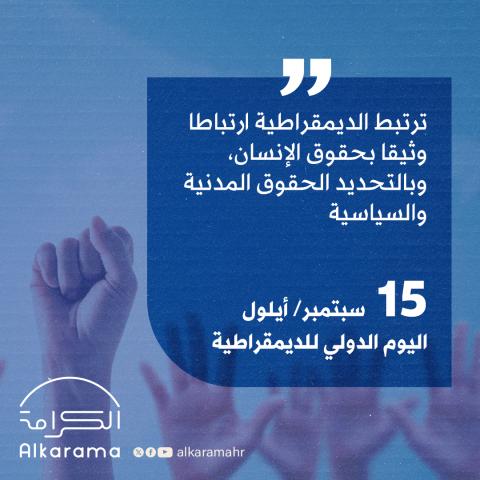
Today, September 15, 2024, the world celebrates the International Day of Democracy, which was established by the United Nations General Assembly in its resolution 62/7 of November 8, 2007, in order for the United Nations system to support the efforts of governments to promote and consolidate new or restored democracies.
All peoples aspire to self-government, and that is what democracy is supposed to provide for societies that choose that political system. In the Arab world, even if Islamists and secularists disagree on whether sovereignty belongs to the people or to Sharia, they agree that the people are the sole source of power.
Democracy is closely linked to human rights, especially civil and political rights. In its resolution 2002/46 of 23 April 2002 entitled "Further measures to promote and consolidate democracy", the United Nations Commission on Human Rights – replaced in 2006 by the Human Rights Council – defined democracy as the following essential elements: “(1) respect for human rights and fundamental freedoms, freedom of association, freedom of expression and opinion, (2) access to power and its exercise in accordance with the rule of law, (3) the holding of periodic free and fair elections by universal suffrage and by secret ballot as the expression of the will of the people, (4) a pluralistic system of political parties and organizations, (5) the separation of powers, (6) the independence of the judiciary, (7) transparency and accountability in public administration, and (8) free, independent and pluralistic media.”
Most Arab countries are ruled by authoritarian regimes that suppress any attempt at democratic transition and continue to close political and media space, stifle opposition voices, and violate freedom of opinion, expression, and association. Western countries, especially the superpowers, support these authoritarian regimes and seek to keep them in power to protect illegitimate interests guaranteed by illegitimate regimes.
While the United States and European countries strongly supported the democratic transitions in Eastern Europe, they were negative about the free and fair elections that took place in the Arab world, such as in Algeria in 1992, Palestine in 2006, and Egypt in 2011, and preferred to support the authoritarian regimes in these countries against the political forces chosen by the peoples of these countries. This Western double standard has led to the prevailing impression among Arab citizens that the West considers democracy to be a system that only the white man deserves and is not suitable for other races, including Arabs and Muslims.
Since its inception, Alkarama has prioritized the promotion and protection of the civil and political rights of citizens in the Arab world, as enshrined in the International Covenant on Civil and Political Rights. Over two decades, Alkarama has submitted hundreds of legal communications to UN human rights mechanisms regarding the ongoing violation of these rights in most Arab countries, and has provided counseling to victims of violations. Through its activities, Alkarama contributes to raising awareness of human rights in the Arab world and to changing the prevailing political culture, which is based on political exclusion, disregard for the citizen, access to power through military coups, and authoritarian rule, to a culture of respect for the legitimacy of the ballot box, inclusive political participation to build a state of law and good governance, and emphasizing commitment to peaceful means of struggle for change.
